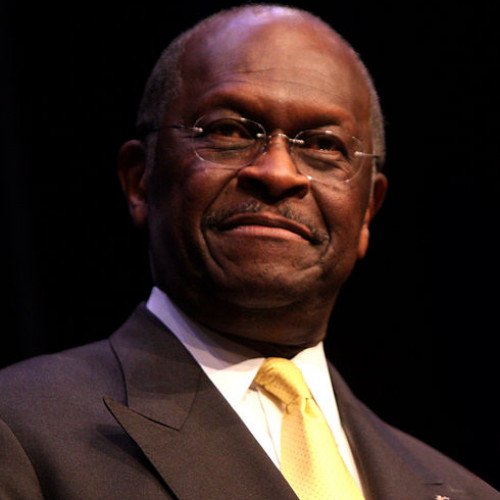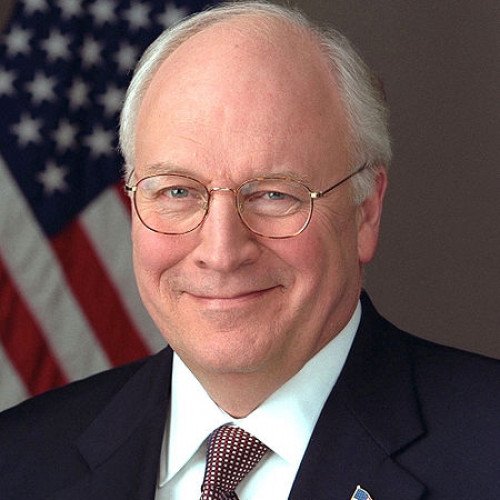Herman Cain VS Dick Cheney

Herman Cain
Herman Cain (December 13, 1945 – July 30, 2020) was an American businessman and activist for the Tea Party movement within the Republican Party. Born in Memphis, Tennessee, Cain grew up in Georgia and graduated from Morehouse College with a bachelor's degree in mathematics. He then earned a master's degree in computer science at Purdue University while also working full-time for the U.S. Department of the Navy. In 1977, he joined the Pillsbury Company where he later became vice president. During the 1980s, Cain's success as a business executive at Burger King prompted Pillsbury to appoint him as chairman and CEO of Godfather's Pizza, in which capacity he served from 1986 to 1996. Cain was chairman of the Federal Reserve Bank of Kansas City Omaha Branch from 1989 to 1991. He was deputy chairman, from 1992 to 1994, and then chairman until 1996, of the Federal Reserve Bank of Kansas City. In 1995, he was appointed to the Kemp Commission and, in 1996, he served as a senior economic adviser to Bob Dole's presidential campaign. From 1996 to 1999, Cain served as president and CEO of the National Restaurant Association. In May 2011, Cain announced his 2012 presidential candidacy. By the fall, his proposed 9–9–9 tax plan and debating performances had made him a serious contender for the Republican nomination. In November, however, his campaign faced allegations of sexual misconduct, which he denied. He announced the suspension of his campaign on December 3, but remained involved in politics. In the 2020 election cycle, Cain was a co-chairman of Black Voices for Trump. Cain died from COVID-19 on July 30, 2020, at the age of 74.
Statistics for this Xoptio

Dick Cheney
Richard Bruce Cheney ( CHAY-nee; born January 30, 1941) is an American politician and businessman who served as the 46th vice president of the United States from 2001 to 2009 under George W. Bush. He has been cited as the most powerful vice president in American history. He is also one of the most unpopular politicians in the history of the U.S., holding an approval rating of just 13% at the time of leaving office.Born in Lincoln, Nebraska, Cheney grew up there and later in Casper, Wyoming. He attended Yale and then the University of Wyoming, at the latter of which he earned a BA and an MA in Political Science. He began his political career as an intern for Congressman William A. Steiger, eventually working his way into the White House during the Nixon and Ford administrations. He served as White House chief of staff from 1975 to 1977. In 1978, Cheney was elected to the U.S. House of Representatives. He represented Wyoming's at-large congressional district from 1979 to 1989, briefly serving as House minority whip in 1989. Cheney was selected to be the secretary of defense during the presidency of George H. W. Bush, holding the position for the majority of Bush's term from 1989 to 1993. During his time in the Department of Defense, Cheney oversaw the 1991 Operation Desert Storm, among other actions. Out of office during the Clinton administration, Cheney was the Chairman and CEO of Halliburton Company from 1995 to 2000. In July 2000, Cheney was chosen by presumptive Republican presidential nominee George W. Bush as his running mate in the 2000 presidential election. They defeated their Democratic opponents, incumbent Vice President Al Gore and Senator Joe Lieberman. In 2004 Cheney was reelected to his second term as vice president with Bush as president, defeating their Democratic opponents Senators John Kerry and John Edwards. During Cheney's tenure as vice president, he played a leading behind-the-scenes role in the George W. Bush administration's response to the September 11 attacks and coordination of the Global War on Terrorism. He was an early proponent of invading Iraq, alleging that the Saddam Hussein regime possessed a weapons of mass destruction program (no active WMDs were in Iraq) and the Hussein regime had an operational relationship with Al-Qaeda (even though there was scant credible evidence of such a relationship at the time). He also pressured the intelligence community to provide intelligence consistent with the administration's rationales for invading Iraq. Cheney was often criticized for the Bush Administration's policies regarding the campaign against terrorism, and for his support of wiretapping by the National Security Agency (NSA) and of torture. He became at odds with President Bush's position against same-sex marriage in 2004.